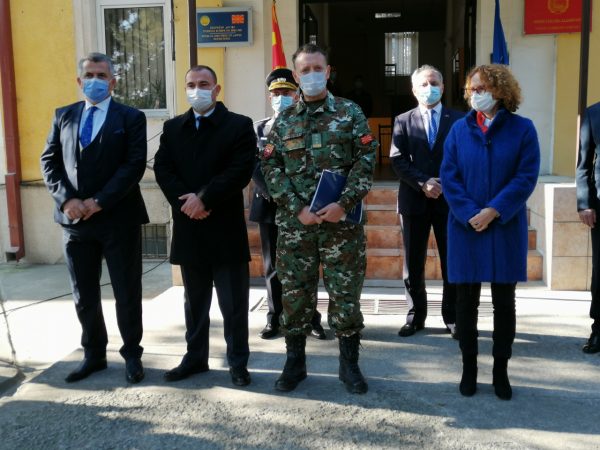A Crisis Management Laboratory at the Skopje-based Military Academy “General Mihajlo Apostolski” opened on Thursday. The laboratory is part of the Next-Generation Incident Command System (NICS) project of the Military Academy and the Crisis Management Center (CMC) in cooperation with the NATO Science for Peace and Security Programme. The project aims to digitize the crisis management system, including a swift exchange of data and information on a certain crisis situation.
CMC acting director Stojanche Angelov addressed the opening event, pointing out that one of the most modern measures being developed in the field of crisis management in the country is the implementation and application of the NICS web-based communication platform.
“The NICS platform enables spatial display of data in order to deal with events in real time, while also enabling swift and efficient communication and coordination between entities of the crisis management system in making decisions for efficient management,” Angelov said.
He added that NICS will be fully implemented by the end of 2021, thus providing the country with a functional digital crisis management system of the latest generation at its disposal.
Defense Minister Radmila Shekerinska stressed that the software provides additional support to all institutions obliged to cooperate, enabling them to be more efficient in dealing with the coronavirus crisis and all other natural disasters.
“The NICS, which is the result of our participation in the NATO Science for Peace and Security Programme, as well as the efforts made by the Military Academy, CMC and the Lincoln Laboratory, shows we’re investing in advanced technologies that will be the basis of our operation,” Shekerinska said.
According to her, the NATO membership and the events related to the coronavirus crisis have shown that the Alliance truly believes in the meaning of alliance and that the ‘all for one – one for all’ principle is not just a word, but action.
“So far we have relied on support coming from NATO and the member states, and in this way we show that NATO is also an investment in science at home because in addition to the products and the software by the Lincoln Laboratory, it is also a result of work by Macedonian scientists who continue developing such advanced way of work,” Shekerinska said.
The Defense Minister added that all institutions will need to get used to the system and it won’t be an easy process. According to her, 1,100 employees from different institutions have already received training. However, institutions will now need to use it in practice, and see that even though it will change their way of work, such change is worth it.















